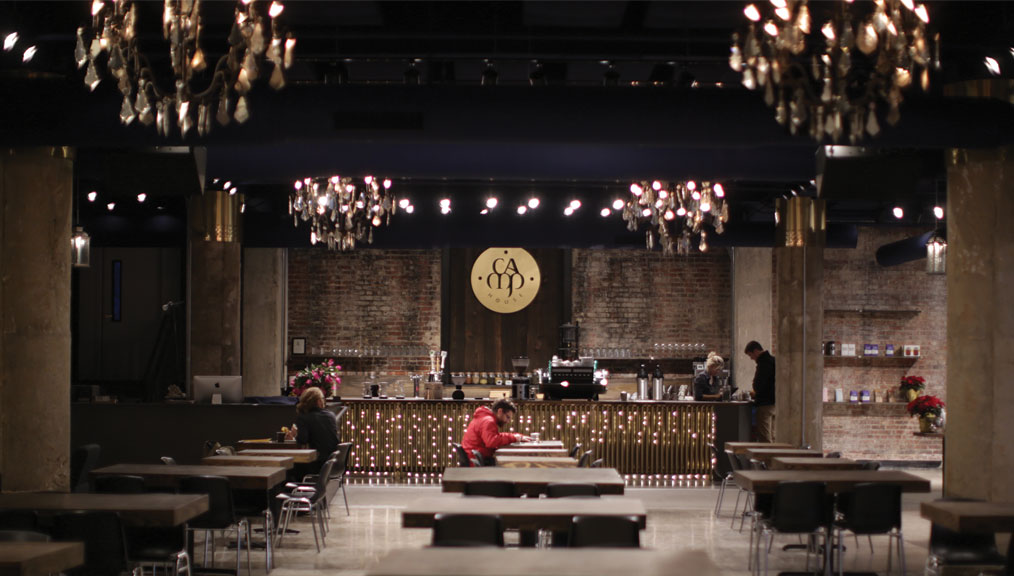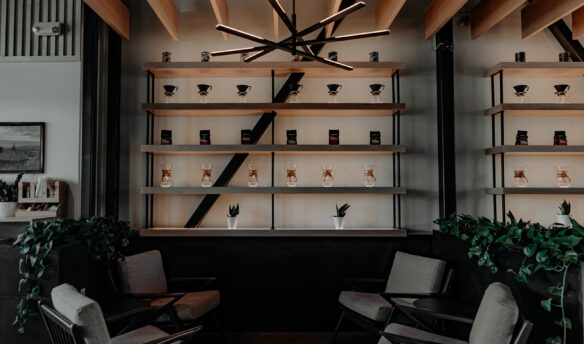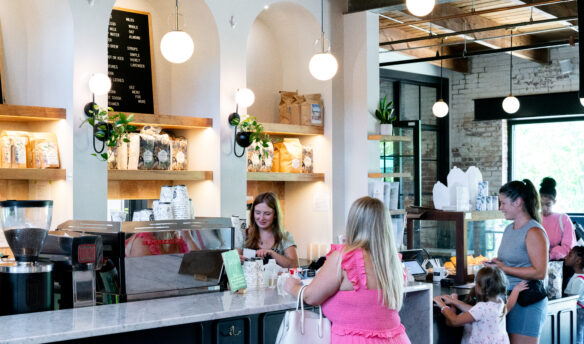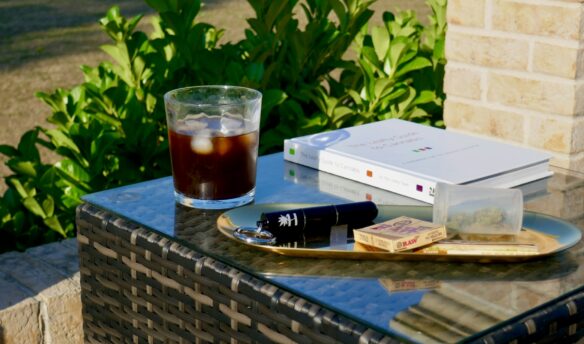This post is the part of a series examining how café owners can expand their business by hosting events.
Packed House: Concerts
[I]n Chattanooga, Tennessee, the Camp House opened with plans that only included coffee. “We hadn’t thought about doing anything beyond a coffee shop, and people started approaching us about wanting to rent out the space,” says director Matt Busby. Camp House is “too big to only do coffee,” with a long, spacious room stretching between the coffee bar and stage. Large chandeliers and a stained glass window add to the drama of the space, and they now host 175 events a year, including concerts, films, conferences, corporate events, as well as some private events.
For Cup 22 in the Haw River Ballroom in Saxapahaw, North Carolina, the café was built to be a joint coffee shop and venue, balancing both from the start. The building is three stories, with the café on the second floor, overlooking a curtained stage and large seating area on the first floor. On the third floor, the balcony is full of comfy couches and small tables for café patrons, and for overflow at events. Of the 100 events a year hosted at the ballroom, many are concerts, though they also dabble in conferences and weddings. “Sold-out shows are what we’re made for,” says Matt Shepherd, operations manager and technical director.
It’s important to know that your shop will likely need two separate licenses if you host events, one for ambient, “coffee shop” music and one for live music.
Camp House and Cup 22 agree that drinks are an important part of their events. While coffee is available to event attendees at both spaces, Camp House offers an extended beverage menu through their full bar, and Cup 22 sells beer. “The vast majority of these events are at night, so it’s important to have a variety of beverages since most people won’t be drinking a latte at 8:00 p.m.,” says Busby.
Concerts present multiple challenges for cafés. To begin with, finding bands requires time and research. Both Camp House and Cup 22 monitor regional tour schedules and pitch to bands they think will be a good fit at their café. Busby says he likes to work with event promoters when possible, because it’s typically less risk for the venue. “The contract for the artist is not on us, it’s on the promoter,” he says.
Both cafés stress music licensing, and it’s important to know that your shop will likely need two separate licenses if you host events, one for ambient, “coffee shop” music and one for live music. Camp House is licensed by three different regulatory organizations to host one to three events per week. At Cup 22, Shepherd says, “We have pretty much every license you can buy.” However, dual spaces sometime come with complications. One licensing company tried to charge Cup 22 as if it had 700 seats, which is true for the venue, but not applicable to the usual crowd in the café. “We had to negotiate back down to a reasonable fee to be able to play coffee shop music,” Shepherd says.
Large crowds also mean longer lines—even topping counts in the hundreds. Though the sight of winding lines can bring stress to baristas and other staff, Cup 22 café manager Karina Ledaja-Long faces the problem with simple practicality: “They’re in line, and they’re here for a reason. One person at a time,” she says of the advice she gives to staff.
Despite the challenges, concerts and other public events welcome new business. Busby says it opens their shop to a whole new set of patrons, and sometimes, one-time event attendees become regular café customers. For Cup 22, which is located in a small, rural town, concert attendees are often surprised to discover Haw River Ballroom also houses a coffee shop. As a hospitable gesture, they often offer free coffee to patrons after sold-out shows, and coffee and food are always available to the band. “We understand that this is a destination for most people, we want to get them home safe and awake,” says Ledaja-Long. The gesture has the added benefit of ensuring some people return to Cup 22 just for the café.
—Kaitlin Throgmorton is a freelance writer based in North Carolina.
More in this series:
- Cafés as wedding venues (Part One)
- Community meeting spaces (Part Three)
- Considerations for café owners

















